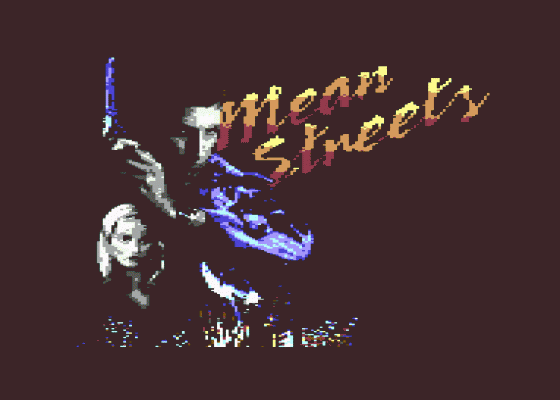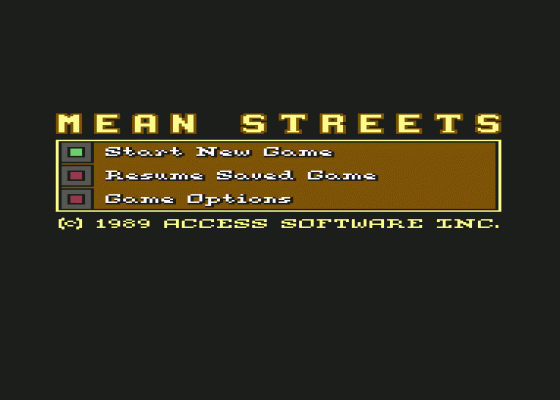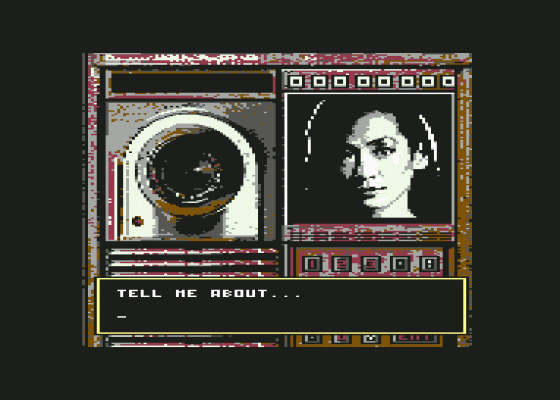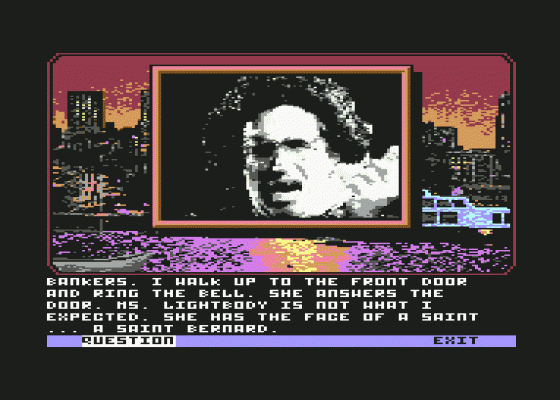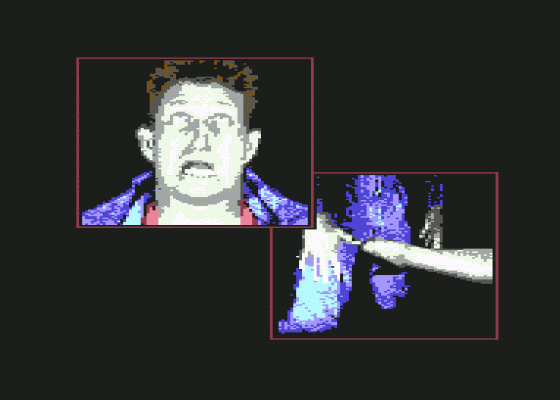
Commodore Format
 1st October 1990
1st October 1990
Categories: Review: Software
Publisher: Access
Machine: Commodore 64
Published in Commodore Format #1
The name's Murphy, Tex Murphy. The word is that there's a game on the streets with my name on it. I'm warning you, it's big, tough and slow - like the Ed. Still wanna mess with it? Okay, sit down and listen, punk.
Mean Streets (Access)
It's the year 2033. You're Tex Murphy, San Francisco private investigator and alcoholic. Sylvia Linsky, the beautiful daughter of a university professor, walks into your office one day and offers you ten thousand dollars to uncover the facts about her father's death. The cops say it's suicide; she thinks it's murder; you think, "Aha, maybe I can pay the bills this month." Maybe you can if you live long enough. But is Ms Linsky what she seems? Course not.
Mean Streets is a mystery adventure spanning two double-sided disks. Basically, you have to question suspects, search their homes and offices, figure out who's lying most and therefore killed professor Linsky. Finding out why he/she/they did it isn't a bad idea either.
You're given the addresses of all the people initially involved with the case. You can fly to any of these addresses in your speeder, either on autopilot or manually. This, Access boasts, means the game includes a flight simulator but it's not a very exciting one. The graphics update too slowly to really make the idea of flying around for fun very appealing, although there is a facility for simplifying the display in order to speed things up. By and large though, there's no need to take manual control of the speeder unless you start running short of money and have to go bounty hunting, Some outlaws, who have no connection with your case, have a bounty value. You have the approximate co-ordinates at which they may be found but because they don't have proper addresses, you must fly there manually and fight them in a gun battle. If you kill them, their bounty value is added to your cash total. It's a dirty job etc...
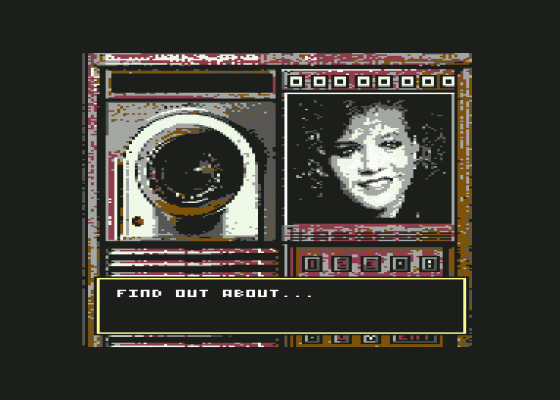
When you fly to someone's address, the game describes the scene in words Murphy would use. Then a digitised picture of the suspect appears along with the options Question, Bribe, Threaten and Exit. To ask about somebody or something, you just type in a name. If the suspect doesn't know anything at all, you have to try elsewhere. If you think they're holding something back, you can try scaring them, beating them up or, if you're feeling charitable, you can push a wad of cash under their noses. Bribing is easy. The suspect either won't want your money or will spill everything for the right price. Threatening can work, but some suspects are tougher than you, so be prepared to get a bloody nose. The mug shots become animated as responses appear at the base of the screen. It's a feature that has prompted Access to call this game an "interactive movie".
Sometimes you get involved in gunfights in arcade sequences set in grimy alleys. You appear at the left end of the alley. On the right are a couple of machine-gun-toting goons whose only concern is using you for some target practice.
You have to get across to the right hand side of the screen with the fewest possible bullets in you. You can duck to avoid bullets but can only walk when standing upright, so you peg it between bursts of enemy fire. You can shoot back whether crouching or upright (but not while you're moving). At least the enemy rarely duck, making them easy to hit. They do, however, receive plenty of reinforcements.

There are also locations to investigate. A joystick-controlled Murphy can search for, examine and pick up almost anything he can see. A menu beneath the graphic display indicates which objects he's near. This is updated whenever something is moved, taken, opened or switched on, as the action may reveal another object. The biggest flaw with this system is that once something is picked up, it can't be put down or examined in detail (a book I found, for instance, could not be opened once it had been picked up). There's no excuse for an infuriating restriction like this.
From your speeder you can call two sidekick characters, via your videophone. Vanessa is a cheery secretary who can fax useful info straight to your speeder, so long as the facts you want are already stored at your office. To find out about the shadier characters you encounter you have to call Lee Chin, an informant who charges a small fortune for her services.
Things I haven't mentioned so far include a pawn shop feature which helps when you're low on funds and don't want to risk your neck bounty hunting. There are also some tacky musical scores, reasonable sound effects and a save game option that allows up to eight games to be saved and restored: this option is only available from the speeder.
Mean Streets keeps becoming more complicated just when you think you've got it sussed. But you spend at least half the time waiting for the program to load data from the disk! This is no exaggeration. Sometimes it's just ridiculous. Leaving somewhere and returning immediately can require up to three disk changes! That's not all. The game controls are as responsive as a sloth on Valium: joystick control is adequate but command the keys used for dialling, auto-piloting and so on have to be held down or pressed repeatedly before they function. Interesting the game is: interactive movie it certainly isn't (winner of this issue's pretentious title award). Definitely only for those with the patience of a saint.
Time To Die
Mean Streets take place just over fifty years from now, following a nuclear conflict that somehow didn't destroy civilisation. But the game does try to show how it may have changed society. When you fly the speeder over the west coast of America, the sky is apocalypse orange. Atmospheric effects are also hinted at by the static charges that disrupt videophone calls. In the manual, there's a reference to radiation levels being measured as part of the weather forecasts. As for lifestyles, unless you keep to the rich part of town, there is no law enforcement - except yours. The coroner's office even employs minders. For all its faults, Mean Streets succeeds in painting a picture of a world coughing up blood.
Good Points
- A case of disk access gone mad.
- Sluggish command keys.
- Not enough control of objects.
- "Flight-Sim" is more hassle that it's worth.
Bad Points
- Compelling and complicated plot to confound investigators for weeks.
- No parser problems thanks to joystick control.
- Superb use of animated and digitised images for non-player characters.
- Effective use of arcade graphics.
- Evocative (look it up!) game world.
- Good manual and accessory sheets.
- Neat hierarchical menu system for examining objects.


